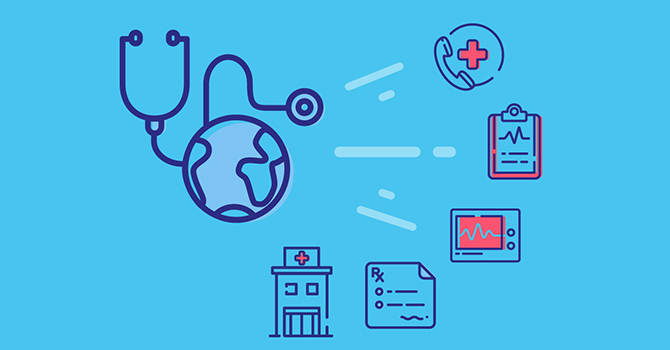Healthcare RCM: Optimize Revenue Cycle Administration for Better Results
Healthcare RCM: Optimize Revenue Cycle Administration for Better Results
Blog Article
Understanding the Function of Healthcare RCM in Enhancing Economic Performance and Client Fulfillment
Browsing the complexities of Health care Income Cycle Administration (RCM) is necessary for achieving optimum economic performance while concurrently raising person satisfaction. As we explore the transformative capacity of RCM, inquiries concerning its strategic application and future improvements bid, encouraging insights that could redefine market requirements and patient experiences alike.

Secret Elements of RCM
In the complex landscape of medical care, Earnings Cycle Monitoring (RCM) is critical in making certain financial stability and operational performance. Person enrollment and qualification verification are fundamental steps, making certain that exact individual details is caught and insurance protection is confirmed before services are provided.

Cost capture is an additional important element, entailing the precise recording of solutions provided to people. It guarantees that all billable solutions are accounted for, consequently making best use of profits capacity. Simultaneously, clinical coding translates patient experiences right into standardized codes, which are important for invoicing and regulative compliance.
Claims submission and administration adhere to, involving the preparation and submission of claims to payers. This procedure requires thorough attention to information to reduce errors and avoid hold-ups. Rejection administration is a proactive approach to resolve and attend to rejected cases, securing earnings streams.
Last but not least, payment posting and client collections complete the cycle, ensuring repayments are accurately tape-recorded and superior balances are pursued. With each other, these parts create a robust structure that sustains the functional and economic health of health care organizations.
Effect On Financial Efficiency
Effective Revenue Cycle Management (RCM) significantly affects a healthcare company's economic efficiency by enhancing cash money circulation and decreasing income leak. RCM includes the detailed billing and collection processes that ensure doctor successfully handle their monetary transactions from person registration to last settlement. By enhancing these procedures, organizations can lessen rejected claims, accelerate repayment cycles, and improve total monetary health and wellness.
Economic efficiency is improved via careful administration of invoicing procedures, which entails accurate coding and prompt entry of claims. This decreases the likelihood of insurance claim denials and beings rejected, which can substantially prevent profits circulation otherwise dealt with without delay. Additionally, incorporating innovative modern technology services helps with real-time tracking of insurance claims and economic metrics, offering health care administrators with the tools required to make informed tactical choices.

Enhancing Patient Complete Satisfaction
While enhancing financial performance is an essential goal of Revenue Cycle Management (RCM), it likewise plays a pivotal function in improving client complete satisfaction. Clients today demand openness, performance, and precision in their healthcare communications. RCM systems enhance these procedures, offering individuals a smooth experience from appointment organizing to settlement. By decreasing management burdens, RCM allows doctor to focus much more on client care, which directly improves individual complete satisfaction.

RCM additionally enhances patient satisfaction with efficient interaction. By preserving a detailed data source of client information, RCM facilitates enhanced interaction between individuals and medical care companies, ensuring clients really feel informed and valued.
Approaches for Efficient RCM
Attaining effective Earnings Cycle Management (RCM) calls for medical care organizations to execute a collection of critical practices that make sure monetary security and operational effectiveness. One essential method is the fostering of technology-driven remedies, such as integrated software application platforms that streamline payment procedures, decrease errors, and enhance data precision. These systems allow real-time monitoring of monetary metrics, enabling timely recognition and rectification of ineffectiveness.
Another strategy is the standardization of processes across the income cycle. Healthcare RCM. This entails establishing constant plans for patient registration, insurance verification, and claims processing. By ensuring that all personnel stick to these criteria, organizations can reduce discrepancies and accelerate repayment collections
Personnel training and growth additionally play a pivotal duty in effective RCM. Well-trained personnel can effectively browse complex invoicing treatments and laws, enhancing and reducing denials capital. Normal updates on policy modifications and best practices assist preserve a experienced and skilled labor force.
Future Trends in RCM
As health care organizations enhance their Profits Cycle Administration reference (RCM) approaches with innovation and standard procedures, interest is currently transforming towards the future patterns find more information shaping this critical location. One significant fad is the integration of expert system (AI) and maker knowing to automate intricate tasks, such as insurance claims refining and anticipating analytics. These innovations are expected to decrease errors, increase deal times, and supply data-driven understandings for far better decision-making.
Additionally, the shift towards value-based care continues to influence RCM practices - Healthcare RCM. Healthcare providers are anticipated to increasingly concentrate on person outcomes and contentment, necessitating RCM systems that can accommodate new compensation versions. This change will require more comprehensive information collection and evaluation to efficiently gauge and report on efficiency metrics
Interoperability is another emerging concern, as seamless data exchange in between disparate systems comes to be vital. Enhanced interoperability will certainly promote more exact individual details sharing, lowering administrative burdens and boosting the patient experience.
Final Thought
Health Care Earnings Cycle Management (RCM) substantially influences both monetary efficiency and individual satisfaction by enhancing billing processes, guaranteeing exact coding, and allowing prompt cases entry. Reliable RCM minimizes profits leak and accelerates money circulation, reducing insurance claim rejections and expediting payments. This performance fosters depend on and complete satisfaction among individuals. RCM systems also facilitate much better communication and adaptable payment choices, creating a patient-centered experience. Future RCM fads will likely concentrate on further integrating modern technology to boost these advantages.
Navigating the intricacies of Health care Revenue Cycle Administration (RCM) is crucial for achieving ideal monetary efficiency while at the same time raising client satisfaction. RCM incorporates the thorough payment and collection procedures that guarantee medical care suppliers effectively manage their economic purchases from person registration to other last payment. By reducing management problems, RCM enables medical care carriers to focus a lot more on client care, which straight improves individual contentment.
By maintaining a detailed data source of individual information, RCM facilitates boosted interaction in between individuals and medical care providers, guaranteeing people feel educated and valued.Medical Care Income Cycle Management (RCM) significantly affects both financial performance and patient contentment by maximizing invoicing procedures, ensuring exact coding, and enabling punctual claims submission.
Report this page